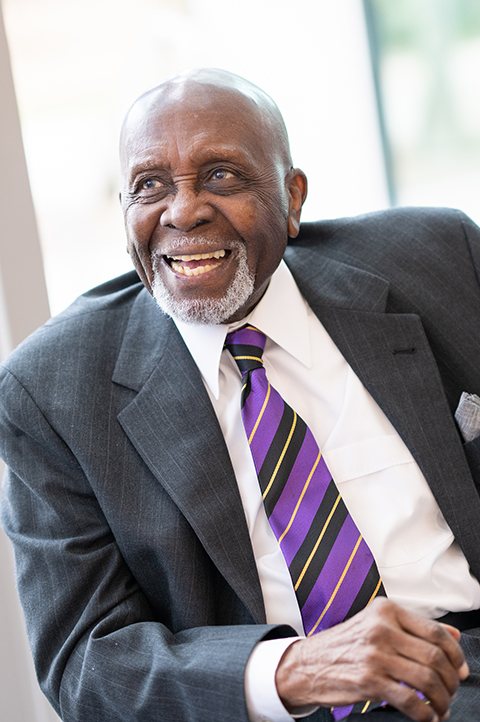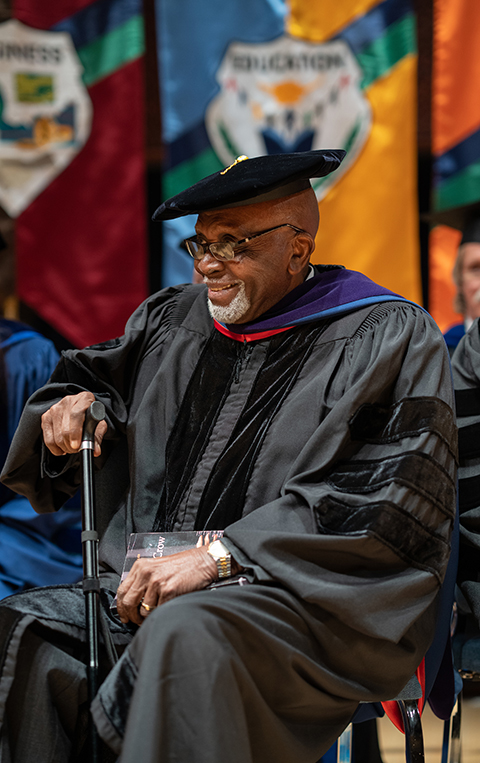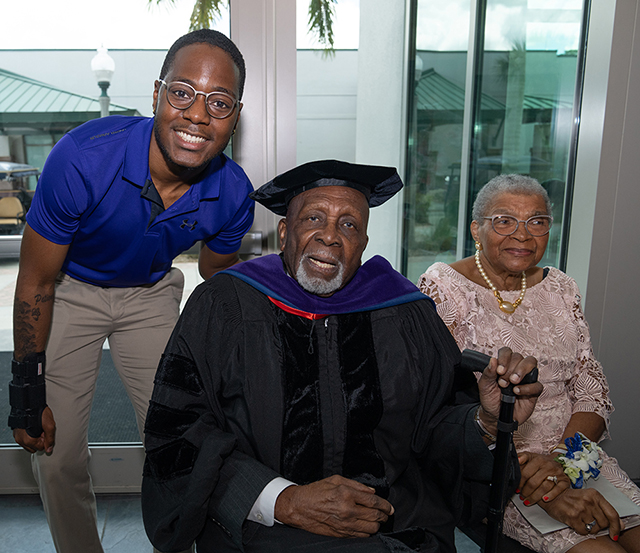Even as a child, Cornelius “Pat” Cacho valued education above most things. Born into modest means in British Honduras (now Belize), he took advantage of every opportunity to learn and better himself.

It paid off, and he’s been paying it forward ever since. Cacho has changed the lives of countless young people over the past 30 years, including dozens of Florida Gulf Coast University students. In appreciation for his many contributions and tireless support, FGCU recently bestowed the honorary doctor of laws degree upon him.
Cacho, 96, grew up the only child of parents who possessed few worldly goods but fierce determination and unity of purpose when it came to ensuring their son received an education. They worked hard to pay the tuition required to send him to school. After completing his high school education, he became a messenger in the national Treasury Department and took correspondence courses to become an accountant.
A supervisor took an interest in the ambitious young man and arranged to send Cacho to England to study. There he earned his accounting certificate, fell in love with economics and earned his bachelor’s and master’s degrees at the London School of Economics.
Upon returning to Belize, he was appointed the assistant secretary of natural resources, a position in the country’s ministry responsible for assessing and managing natural resources.
“I didn’t know a damn thing about natural resources,” he says.
But he learned. Among his accomplishments was forging an agreement with a group of Mennonites to relocate from Mexico to create a community in Belize that remains today. The job exposed him to many opportunities, including a six-month attachment to the World Bank through which he made many professional contacts. He spent four years in Trinidad and Tobago, working at the University of the West Indies as a bursar and a lecturer on international economics. Then the World Bank offered him a job as an operations officer. He spent the next 20 years in various capacities within the organization in countries across Africa, Asia and Central America.
Upon retiring, he and his wife, Laura, chose to live in Naples. As they got to know their new community, they saw what he describes as “large and disturbing gaps in education and training among African American children and educational deficiencies in the Black population generally.”
That helped the couple decide what they would do next.

Cacho visited the Collier County superintendent of schools and volunteered his services. For 18 years, he tutored high school and middle school students, primarily Black individuals, whom he believed he could help. One cultural difference he saw disturbed him: “Black Americans suffer from a terrible inferiority complex. We tried to make them feel that people should respect them.”
He also urged the students he mentored to pursue careers in science, believing there is a great need for more people of color in STEM fields.
Cacho has given his time, talent and treasure to organizations such as the Collier County Community Foundation, Cleveland Clinic, Greater Naples Leadership Council, Early Childhood Coalition of Southwest Florida, Model United Nations, FunTime Early Childhood Academy and many more.
His wife was dedicated to similar activities until her death in 2007. Cacho has since married Leonie Samuels, a former Punta Gorda teacher, who shares his community interests.
FGCU has been fortunate to receive a great deal of his attention and generosity. Cacho has served on the FGCU Foundation Board, is a member of the President’s Society and supported the STEM Camp program, international programs, WGCU Public Media, the College of Education Literacy Festival and the College Reach Out Program. He also provided scholarships for more than two dozen students.
Among those is Kaelyn Julmeus, who graduated in May 2022 and won 11 student awards along with her biology degree. One of those awards was a Fulbright grant to teach English in Poland this fall. Much like her benefactor, Julmeus understands how valuable an education is and makes the most of the opportunities afforded her. The Honors College alumna chose to be a non-degree-seeking student for the summer so she could conduct research in the Peruvian Amazon for 3 ½ weeks. Her plan upon returning home was to study for the MCATs and then head to Poland. After that, she hopes to go to medical school to become a surgical oncologist.

She is grateful to Cacho – as well as Lee Health and Uncommon Friends – from which she received sufficient scholarship money so that she graduated debt free.
“I like what his goal is,” Julmeus says. “He thinks Black students are underrepresented and don’t have access. He wants more Black students to succeed.”
Madelyn Isaacs, a retired founding faculty member who taught counseling at FGCU and has known Cacho for 30 years, says, “Pat is one of a kind. He never slows down. He is the model of what someone can do with passion for young people.”
Jean Sagesse, a senior majoring in exercise science, is a fine illustration. The Naples resident’s future changed when he signed up for a STEM camp and met Cacho.
“I didn’t know if college was for me,” Sagesse says. “I became aware through the STEM camp, got interested in exercise science and it made me decide to come to FGCU. Mr. Cacho gave me exposure to college.”
Michele Yovanovich, former FGCU dean of students and now vice president of student affairs at Florida SouthWestern State College, says, “He inspires me. He’s not only an advocate, but he also financially supports programs for students of color. He walks the walk, not just talks the talk.”
